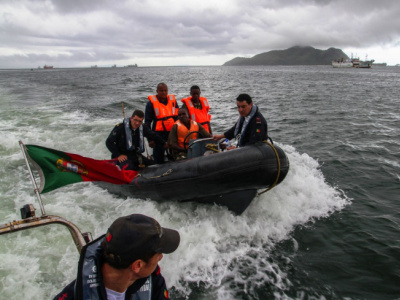From Africa Defense Forum: 29 January 2019: Africa’s smallest nation is setting a standard for safe, sustainable seas through the prosecution of pirates, international maritime cooperation and proactive measures to protect its exclusive economic zone.
As the six Seychellois crew members of the fishing boat Galate slept at sea southeast of Mahé Island, they should have had little more to fear than awakening to another busy day of hauling in tuna from the Indian Ocean.
Armed bandits, however, were stalking the waters. International naval patrols had pushed pirates hundreds of miles from the Somali coast and the Gulf of Aden. Now some of those pirates had their sights on the fishermen.
About 2 a.m. on March 30, 2010, nine Somali pirates, recently in possession of an Iranian fishing dhow and its 21 crew members, sought to add the Galate to their haul. The pirates had captured the Iranian craft four days earlier, according to a report in afrol News.
By the time the Somali pirates boarded the Galate, pirates already had attacked and captured crews of the Serenity, Indian Ocean Explorer and Alakrana. Then-President James Michel was determined that no more of his people were going to be bargaining chips for Somali-based pirates.
Michel ordered the Seychelles Coast Guard vessel Topaz to intercept the dhow, which was towing the Galate, and prevent it from reaching Somalia. If the Topaz failed, another prolonged and dangerous ordeal to secure the crew members’ release was almost sure to follow.
With help from European Union Maritime Patrol Aircraft, the Topaz found the dhow and fired warning shots. Then, the Topaz fired on the dhow’s engine, disabling the boat and setting it ablaze. The pirates, Iranians and Seychellois fishermen jumped into the sea and were rescued. As it returned home, the Topaz had to repel another pirate attack, firing on and sinking a skiff and a mother ship. Another skiff escaped.
“We all remember the pain and uncertainty when our compatriots on board the Serenity, Indian Ocean Explorer and Alakrana were being held hostage by pirates last year,” Michel said after the Galate incident, afrol News reported. “We were determined that such incidents do not repeat themselves, and it was important that the vessel not be allowed to reach Somalia.”
In the years since the Galate incident, the Seychelles has been leading the way in the prosecution and imprisonment of East African pirates, bolstering its small Coast Guard, forging agreements and alliances with foreign powers, and ensuring the preservation and protection of its vast maritime domain. The work is paying off. Africa’s smallest nation is setting a standard for the continent.
“The blue economy has become the focal point of the national economy, and more than probably any other state, Seychelles has come to terms with the reality of its geography and embraced it as a positive and not just a challenge,” Ralby said.
More in the full article written by Africa Defense Forum

